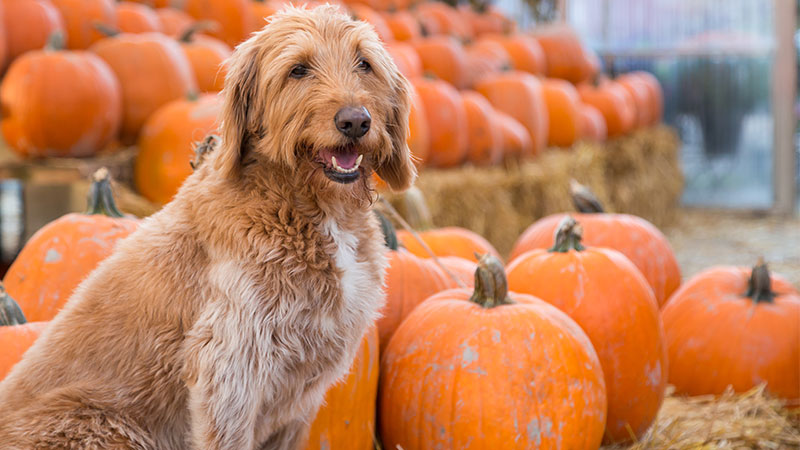Fall is nearly here and that means cooler temperatures, changing leaves, and, of course, a number of foods that just taste better this time of year. Many of these autumn treats can even make a nutritious, tasty addition to your pet’s diet. No, you shouldn’t let your cat into the Halloween candy or save your dog a seat at the Thanksgiving table, but these fall favorites are safe to share all year round.
Pumpkin for pets
Few foods say fall quite like the pumpkin. Mixed into lattes, baked into pies, or carved on the doorstep, pumpkins are a reminder that autumn is finally here. On its own, and in moderation, the familiar fruit is a great, high-fiber addition to your pet’s diet. It’s rich in vitamins, considered an effective remedy for indigestion, and often recommended as an additive to make new foods more palatable.
When it comes to pumpkin-flavored foods, however, keep your pet away. Pies and other autumn desserts include added fat and sugar that can lead to intestinal distress in the short term and weight gain, diabetes, and other health concerns in the long term. Unfortunately, your pets will have to settle for the scent of pumpkin spice this fall.
Apples
Another ubiquitous autumn fruit, apples are a tasty treat for pets and pet parents alike. These healthy snacks are rich in vitamins C and A, as well as fiber. Teething pets particularly enjoy the sensation of crunching on them. While it’s no substitute for traditional dental care, chewing on apples is known to help fight plaque and freshen breath. Don’t forget that PetPartners DefenderPlus coverage offers reimbursement towards preventative dental cleanings too -- learn more today.
Like pumpkins, apples are only safe in certain forms. Owners should stick to plain, seedless, sliced apples and should remove the skin before feeding as a pet-friendly treat. Large or seeded pieces of fruit present both poisoning and choking hazards. The American Kennel Club notes that apple seeds contain trace amounts of a cyanide-like compound. Consumed in large quantities, it may leave pets suffering from anxiety and labored breathing or send them into shock.
Sweet potato
Sweet potato fries tend to cost extra for a reason. Compared to their non-orange cousins, they’re a far better source of fiber, calcium, and nutrients like vitamins A and C. These can offer immune-boosting benefits for both pets and pet lovers.
Pet owners should be wary of raw sweet potatoes -- or raw potatoes of any kind, for that matter. Uncooked spuds contain a compound called solanine that’s potentially toxic to both dogs and cats. In less extreme instances, the substance can still result in intestinal blockages and other digestive problems. Stick to cooked, unseasoned sweet potatoes as an occasional autumn snack.
Turkey
It wouldn’t be fall without at least a few helpings of Thanksgiving turkey. While a bird basted in oil and rubbed with seasonings will upset your pet’s stomach, plain turkey is a great protein-rich snack. Our pets are meat-eaters, after all. Serve up some plain turkey this year and invite your dog or cat to join in on the holiday festivities. A few words of warning though: Watch out for bones! These present a choking risk and can potentially injure a pet’s mouth or digestive tract.
The World Health Organization regards processed meat as a carcinogen, a substance that causes cancer. That’s why it’s crucial for dog and cat lovers to check labels before feeding their pets anything from the deli. Additives and fillers like nitrites offer nothing in the way of nutritional value and could have dire long-term consequences if consumed frequently. Serve your pets only all-natural, unseasoned, skinless meats to avoid both short-term and long-term health concerns.
Butternut squash
Versatile and long-lasting, the butternut squash is another great seasonal addition to anyone’s table. It boasts many of the same digestion-supporting minerals as the pumpkin and can contribute to a strong immune system. Keep in mind that raw butternut squash may be difficult for a pet to chew and digest.
Your pet may also enjoy a handful of other fall vegetables like spinach, broccoli, cauliflower, and carrots. These should be served plain rather than prepared the way you might eat them. Even a small amount of additional fat, salt, or seasonings can cause allergies or adverse digestive effects. Added ingredients like onion and garlic may prove deadly.
Pet diet guidelines
No matter how healthy they are, human foods are never meant to provide the bulk of your dog or cat’s diet. Foods from the fridge or pantry should be treated like any other indulgence. That is, they should never account for more than 10% of your pet’s caloric intake.
Always introduce new tastes slowly and carefully and consult with your veterinarian before making a major change to your pet’s diet. Contact them immediately if your pet experiences persistent digestive symptoms or shows any signs of poisoning. PetPartners policyholders can also call our 24/7 vet helpline for questions regarding your pet’s health.

